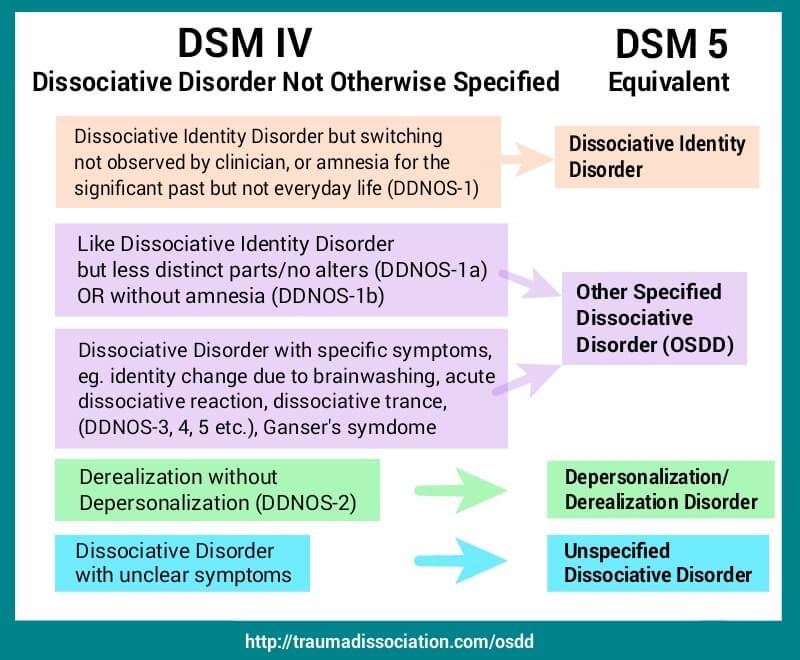Post by The Lunar Crew on Oct 16, 2019 20:24:54 GMT -7
"Unspecified Dissociative Disorder is a diagnosis which was introduced in the DSM-5 psychiatric manual, released in 2013.[1] Along with Other Specified Dissociative Disorder it is partial replacement for the previous diagnosis of Dissociative Disorder Not Otherwise Specified (DDNOS).
The equivalent diagnosis in the International Classification of Diseases is 'Dissociative [conversion] disorder, unspecified'.
The American Psychiatric Association's DSM-5 diagnostic criteria for Unspecified Dissociative Disorder are:
Unspecified Dissociative Disorder DSM-5 Diagnostic Criteria Code 300.15.
"This category applies to presentations in which symptoms characteristic of a dissociative disorder that cause clinically significant distress or impairment in social, occupational, or other important areas of functioning predominate but do not meet the full criteria for any of the disorders in the dissociative disorders diagnostic class.
The unspecified dissociative disorder category is used in situations in which the clinician chooses not to specify the reason that the criteria are not met for a specific dissociative disorder, and includes presentations for which there is insufficient information to make a more specific diagnosis (e.g., in emergency room settings). "
This diagnosis, along with Other Specified Dissociative Disorder, act as a "residual category for dissociative symptoms which do not fit within a more specific category" and either the clinician decides not to specify the reason that the criteria for other Dissociative Disorders aren't met, or not information information exists to make a more specific diagnosis. [4]:198 As described above, there must be clinically significant impairment or impaired functioning as a result of the dissociative symptoms.
If a reason can be specified, e.g., dissociative trance, then Other Specified Dissociative Disorder should be diagnosed instead. Both Other Specified Dissociative Disorder and Unspecified Dissociative Disorder have been assigned diagnostic code 300.15. [1]:306-307"
Resource websites for UDD:
An image map comparing DSM 4 diagnoses to the DSM 5 diagnoses:

~ Kaleidoscope ~
The equivalent diagnosis in the International Classification of Diseases is 'Dissociative [conversion] disorder, unspecified'.
The American Psychiatric Association's DSM-5 diagnostic criteria for Unspecified Dissociative Disorder are:
Unspecified Dissociative Disorder DSM-5 Diagnostic Criteria Code 300.15.
"This category applies to presentations in which symptoms characteristic of a dissociative disorder that cause clinically significant distress or impairment in social, occupational, or other important areas of functioning predominate but do not meet the full criteria for any of the disorders in the dissociative disorders diagnostic class.
The unspecified dissociative disorder category is used in situations in which the clinician chooses not to specify the reason that the criteria are not met for a specific dissociative disorder, and includes presentations for which there is insufficient information to make a more specific diagnosis (e.g., in emergency room settings). "
This diagnosis, along with Other Specified Dissociative Disorder, act as a "residual category for dissociative symptoms which do not fit within a more specific category" and either the clinician decides not to specify the reason that the criteria for other Dissociative Disorders aren't met, or not information information exists to make a more specific diagnosis. [4]:198 As described above, there must be clinically significant impairment or impaired functioning as a result of the dissociative symptoms.
If a reason can be specified, e.g., dissociative trance, then Other Specified Dissociative Disorder should be diagnosed instead. Both Other Specified Dissociative Disorder and Unspecified Dissociative Disorder have been assigned diagnostic code 300.15. [1]:306-307"
Resource websites for UDD:
- traumadissociation.com/udd.html
- did-research.org/comorbid/dd/osdd_udd/index.html
- information.pods-online.org.uk/what-are-the-diagnostic-criteria-for-the-dissociative-disorders/
- www.mind.org.uk/information-support/types-of-mental-health-problems/dissociation-and-dissociative-disorders/dissociative-disorders/#UDD
An image map comparing DSM 4 diagnoses to the DSM 5 diagnoses:

~ Kaleidoscope ~


 ~Kaleidoscope~
~Kaleidoscope~ -casey
-casey